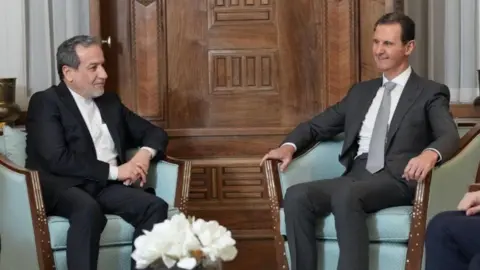https://www.bbc.com/news/articles/cqx89reeevgo
Bashar al-Assad and family given asylum in Moscow, Russian media say
The article discusses the sudden departure of Bashar al-Assad, the former president of Syria, and his family to Moscow, Russia. The move comes after rebel forces seized control of Damascus, leading to the collapse of Assad's government. Russia, a staunch ally of Assad, has been involved in the Syrian civil war for nine years, supporting Assad's forces.

 Reuters
ReutersBashar al-Assad and his family have arrived in Moscow and been granted asylum "out of humanitarian considerations", Russian news agencies are quoting a Kremlin source as saying.
Russian state TV also reported the news, which put an end to speculation about the whereabouts of Syria's former president after rebel forces seized control of Damascus.
Earlier, the Russian foreign ministry had announced that Assad "decided to resign the presidency and left the country, giving instructions for a peaceful transfer of power".
Russia, which has two key military bases in Syria, is a staunch ally of Assad and had intervened in Syria's 13-year civil war in an effort to keep him in power.
But it was unable to stop the collapse of his government in the face of a lightning rebel offensive that took advantage of his other key allies, Iran and Lebanon's Hezbollah movement, being distracted by other conflicts.
- Syria's Assad falls - follow live updates
- Watch: BBC sees looting at Bashar al-Assad's residence
- Steve Rosenberg: Fall of Assad is a blow to Russia's prestige
- HTS leader not only player in Syria's fast-changing future
- Where is Bashar al-Assad?
Assad has not been pictured since he met the Iranian foreign minister in Damascus a week ago. That day, he vowed to "crush" the rebels seizing territory with dizzying speed.
Early on Sunday morning, after their fighters entered the city without resistance, the Islamist militant group Hayat Tahrir al-Sham (HTS) and its allies declared that "the tyrant Bashar al-Assad has fled".
With no official confirmation from the Syrian presidency, military or state media, rumours swirled about Assad's whereabouts.
The head of the Syrian Observatory for Human Rights (SOHR), a UK-based monitoring group, reported that a plane believed to be carrying Assad "left Syria via Damascus international airport before the army security forces left" the facility. Rami Abdul Rahman said he had information that the plane was meant to take off at 22:00 (20:00 GMT) on Saturday.
People also followed flights in and out of Damascus to work out when Assad might have left and where he might have gone.
Reuters news agency cited two unnamed senior Syrian army officers as saying that Assad had boarded a Syrian Air plane at Damascus airport early on Sunday.
It noted that a Syrian Air Ilyushin Il-76T cargo plane took off from the airport at 03:59 local time (01:59 GMT) with an undisclosed destination.
According to data from Flightradar24, the plane initially flew towards the Mediterranean coast, which is a stronghold of Assad's Alawite sect and is also home to two key Russian military bases - Hmeimim airbase and the naval base in Tartous.
But after flying over Homs, the plane made a U-turn and started flying eastwards again while also losing altitude. The plane's signal was lost at around 04:39 (02:39 GMT), when it was about 13km (8 miles) west of Homs and flying at an altitude of only 1,625ft (495m).
- Syria in maps
- BBC in Umayyad Square amid deafening gunfire
- Watch: Presidential palace stormed in Damascus
It was not clear what happened to the plan, but Flightradar24 said the aircraft "was old with an older transponder generation, so some data might be bad or missing", that it was "flying in an area of GPS jamming, so some data might be bad", and that the aircraft tracker was not aware of any airports in the area where the signal was lost. There were also no reports of any plane crashes.
Data from Flightradar24 also showed that a Russian military plane took off on Sunday from Latakia's international airport, next to Hmeimim, and flew to Moscow. Once again, it was not known who was on board.
As well as reporting the arrival of Assad in Moscow, Russian state TV said Russian officials were in contact with representatives of "the Syrian armed opposition" and that they had guaranteed the security of Russian military bases and diplomatic missions.
Russia insisted its air strikes only targeted "terrorists" during its nine-year air campaign in support of Assad, but they regularly killed civilians and destroyed civilian infrastructure.
The SOHR said in September that more than 21,000 people, including 8,700 civilians, had been killed in Russian military operations.
| ### "Be courteous to all, but intimate with few; and let those few be well tried before you give them your confidence", George Washington. ### |

No comments:
Post a Comment